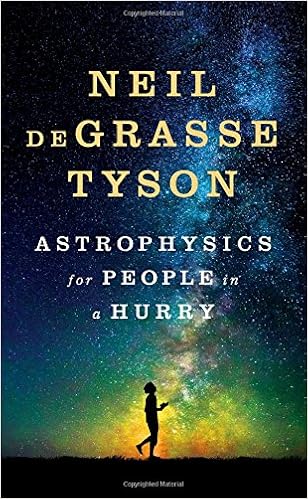The title tells you everything you need to know. Neil deGrasse Tyson's Astrophysics for People in a Hurry is a collection of essays he has written over the years that briefly explains some of the most fundamental and perplexing issues that physicists and astronomers (not astrologers) have grappled with over the centuries. From the Big Bang to Dark Matter, you will be treated to a rapturous scientific breakdown of everything that makes our universe so fascinating, simple, and complicated.
It's certainly a tall order to explain the universe in a little over 200 pages, so don't expect to be thoroughly enlightened by the time you finish this book. I devoured the entire thing in an afternoon and while I was able to follow along fairly well thanks to my scientific education, I still found my head spinning over the chapters on dark matter, dark energy, and Einstein's greatest blunder being that he called lambda, the cosmological constant, his greatest blunder. While it's easy to finish this book off quickly, you will want to revisit certain chapters after you're done to really savor all that information and try to wrap your head around issues that puzzled Isaac Newton.
If you've seen Tyson on talk shows or watched him educate the populace in the new Cosmos, you know that this man is passionate about science. And that passion is evident in every sentence in this book. I've never listened to an audiobook, but as I read this book, I could hear Tyson's voice in my head, excitedly mixing fundamental scientific facts with fun historical anecdotes, and going off on tangents to discuss the sociopoloticial implications of all this knowledge. My favorite chapter was "The Cosmos on the Table," a disarming dissection of the Periodic Table that took all the elements I had mindnumbingly memorized since my high school Chemistry days and gave each one a charming and unique story about its origins, mythological nomenclature, and other assorted tidbits that made me view this taken-for-granted table in a whole new light.
Of course, the final chapter of the book is the most moving, where Tyson is at his most poetic and persuasive. His love for the infinity of the universe is infectious and it is remarkable to see the solace he derives from scientific certitude and the thrill he anticipates in what science has yet to discover. Tyson has a way of explaining the universe that makes it beautiful no matter what you believe in and also makes our petty human squabbles seem tame in comparison with the vastness of what surrounds us. There is so much that humankind has discovered, but there is still so much that we do not know, and Astrophysics for People in a Hurry is an excellent start to your scientific education.
It's certainly a tall order to explain the universe in a little over 200 pages, so don't expect to be thoroughly enlightened by the time you finish this book. I devoured the entire thing in an afternoon and while I was able to follow along fairly well thanks to my scientific education, I still found my head spinning over the chapters on dark matter, dark energy, and Einstein's greatest blunder being that he called lambda, the cosmological constant, his greatest blunder. While it's easy to finish this book off quickly, you will want to revisit certain chapters after you're done to really savor all that information and try to wrap your head around issues that puzzled Isaac Newton.
If you've seen Tyson on talk shows or watched him educate the populace in the new Cosmos, you know that this man is passionate about science. And that passion is evident in every sentence in this book. I've never listened to an audiobook, but as I read this book, I could hear Tyson's voice in my head, excitedly mixing fundamental scientific facts with fun historical anecdotes, and going off on tangents to discuss the sociopoloticial implications of all this knowledge. My favorite chapter was "The Cosmos on the Table," a disarming dissection of the Periodic Table that took all the elements I had mindnumbingly memorized since my high school Chemistry days and gave each one a charming and unique story about its origins, mythological nomenclature, and other assorted tidbits that made me view this taken-for-granted table in a whole new light.
Of course, the final chapter of the book is the most moving, where Tyson is at his most poetic and persuasive. His love for the infinity of the universe is infectious and it is remarkable to see the solace he derives from scientific certitude and the thrill he anticipates in what science has yet to discover. Tyson has a way of explaining the universe that makes it beautiful no matter what you believe in and also makes our petty human squabbles seem tame in comparison with the vastness of what surrounds us. There is so much that humankind has discovered, but there is still so much that we do not know, and Astrophysics for People in a Hurry is an excellent start to your scientific education.

No comments:
Post a Comment